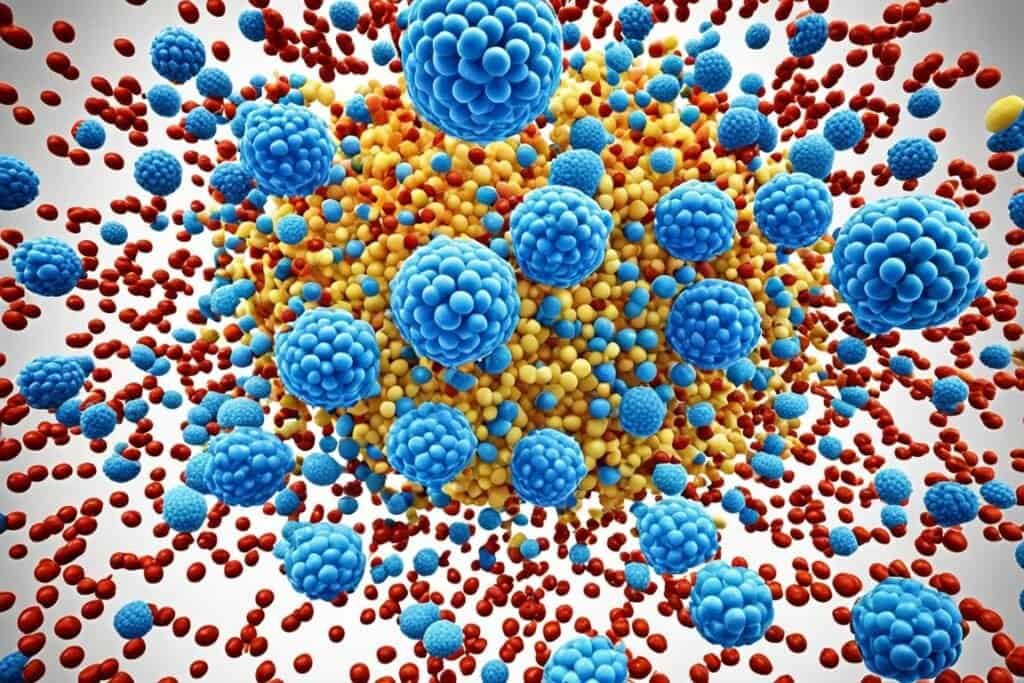Welcome to our informative guide on the impact of cholesterol and how fatty substances can affect your cholesterol levels. Cholesterol is a waxy substance that is essential for building healthy cells in your body. However, when cholesterol levels become too high, it can increase the risk of heart disease.
Fatty substances, such as those found in our diets, play a crucial role in influencing cholesterol levels. Understanding how different types of fatty substances can impact cholesterol is essential for effectively managing and preventing high cholesterol.
Key Takeaways:
- Cholesterol is necessary for building healthy cells but high levels can increase the risk of heart disease.
- Fatty substances, like dietary fats, can contribute to the formation of fatty deposits in blood vessels.
- There are different types of lipoproteins, including LDL and HDL, that carry cholesterol in the blood.
- Lifestyle choices and medical conditions can influence cholesterol levels.
- High cholesterol can lead to complications like atherosclerosis, heart disease, and stroke.
Understanding Cholesterol and Lipoproteins
Cholesterol plays a crucial role in our body, and it is transported in the blood by proteins called lipoproteins. These lipoproteins can be classified into different types, including low-density lipoproteins (LDL) and high-density lipoproteins (HDL). LDL is often referred to as “bad” cholesterol, while HDL is known as “good” cholesterol.
The function of LDL cholesterol is to carry cholesterol to various tissues and organs in the body. However, when LDL cholesterol levels are high, it can lead to the buildup of excess cholesterol in the arteries, increasing the risk of heart diseases such as atherosclerosis.
In contrast, HDL cholesterol acts as a scavenger, helping to remove excess cholesterol from tissues and arteries and transport it back to the liver for metabolism and excretion. Having higher levels of HDL cholesterol is generally considered beneficial for heart health.
| Lipoprotein | Cholesterol Carrier | Function |
|---|---|---|
| LDL (Low-Density Lipoproteins) | Transports cholesterol throughout the body | Can contribute to plaque formation in arteries |
| HDL (High-Density Lipoproteins) | Removes excess cholesterol | Transports cholesterol back to the liver |
It’s important to understand the role of these lipoproteins as they can help determine the impact of fatty substances on cholesterol levels. By managing LDL and HDL cholesterol levels, you can take important steps towards maintaining a healthy heart.

Managing Cholesterol Levels
When it comes to managing cholesterol levels, monitoring your LDL and HDL cholesterol levels is crucial. If your LDL cholesterol is high, you may need to make dietary changes and lifestyle modifications to reduce the risk of heart disease. Incorporating heart-healthy foods, such as fruits, vegetables, whole grains, and lean proteins, can help lower LDL cholesterol. Engaging in regular physical activity, maintaining a healthy weight, and avoiding smoking are also essential for managing cholesterol levels.
On the other hand, focusing on increasing HDL cholesterol levels can also have a positive impact on heart health. Consuming healthy fats, such as those found in olive oil, avocados, and nuts, can help raise HDL cholesterol. Regular exercise, including cardiovascular activities, can also boost HDL cholesterol levels.
By understanding the role of cholesterol and lipoproteins and implementing lifestyle changes, you can effectively manage your cholesterol levels and protect your heart health for years to come.
Factors Influencing Cholesterol Levels
High cholesterol can be influenced by various factors, including lifestyle choices and medical conditions. It is important to address both controllable and uncontrollable factors to manage cholesterol levels effectively.
Unhealthy lifestyle choices are major contributors to high cholesterol levels. A diet high in saturated and trans fats can lead to an increase in cholesterol levels. It is important to limit the consumption of foods like processed meats, fried foods, and full-fat dairy products. Instead, opt for a diet rich in fruits, vegetables, whole grains, and lean proteins.
In addition to diet, other lifestyle factors can also impact cholesterol levels. Obesity, lack of exercise, smoking, and excessive alcohol consumption are all associated with high cholesterol. Maintaining a healthy weight, engaging in regular physical activity, quitting smoking, and moderating alcohol intake can all help lower cholesterol levels.
Medical conditions can also influence cholesterol levels. Certain conditions like chronic kidney disease, diabetes, HIV/AIDS, hypothyroidism, and lupus are known to affect cholesterol levels. It is important for individuals with these conditions to work closely with their healthcare providers to manage cholesterol levels effectively.
In summary, high cholesterol can be caused by both controllable factors, such as lifestyle choices, and uncontrollable factors, such as medical conditions. Making changes to your diet and lifestyle, under the guidance of a healthcare professional, can help manage cholesterol levels and reduce the risk of related complications.
Complications and Risks Associated with High Cholesterol
High cholesterol can have serious complications and increase the risk of developing various cardiovascular diseases. One of the main complications associated with high cholesterol is atherosclerosis. This condition occurs when cholesterol and other substances form deposits called plaque in the arteries, narrowing them and reducing blood flow.
Atherosclerosis can lead to several health problems, including:
- Heart disease: High cholesterol levels can cause plaque buildup in the arteries that supply blood to the heart. This can lead to chest pain (angina) and heart attacks.
- Stroke: If plaque rupture or a blood clot forms in the arteries that supply blood to the brain, it can cause a stroke.
- Peripheral artery disease (PAD): Cholesterol buildup can also affect arteries in other parts of the body, such as the legs. This can result in reduced blood flow, pain, and difficulty walking.
- High blood pressure (hypertension): Elevated cholesterol levels can contribute to high blood pressure, increasing the strain on the heart and blood vessels.
- Coronary artery disease: The accumulation of plaque in the coronary arteries can lead to the narrowing of these important blood vessels, restricting blood flow to the heart.
It is crucial to understand the risks associated with high cholesterol in order to prevent and effectively manage this condition. By making necessary lifestyle changes and seeking medical guidance, you can reduce the likelihood of complications and improve your overall heart health.
| Complications of High Cholesterol | Risks |
|---|---|
| Atherosclerosis | Increased risk of heart disease, stroke, peripheral artery disease, and high blood pressure |
| Heart Disease | Chest pain (angina) and heart attacks |
| Stroke | Impaired blood supply to the brain |
| Peripheral Artery Disease (PAD) | Pain and reduced blood flow to the legs |
| High Blood Pressure (Hypertension) | Increased strain on the heart and blood vessels |
| Coronary Artery Disease | Restricted blood flow to the heart |

Conclusion
To effectively manage your cholesterol levels, it is crucial to make certain dietary changes and lifestyle modifications. By incorporating these practices into your daily routine, you can significantly reduce your risk of developing high cholesterol and related complications.
Start by following a low-salt diet that includes plenty of fruits, vegetables, and whole grains. These foods are rich in nutrients and fiber, which can help lower cholesterol levels. Additionally, limit your consumption of animal fats, as they are often high in saturated and trans fats, which can increase cholesterol levels.
Alongside dietary changes, maintaining a healthy weight is important for managing cholesterol levels. Engaging in regular physical activity can help you achieve and maintain a healthy weight, as well as improve your overall cardiovascular health. Quitting smoking is another crucial step in managing cholesterol levels effectively, as smoking can worsen the impact of high cholesterol on your heart and blood vessels.
Lastly, it is important to manage stress levels and moderate alcohol intake. High stress levels can contribute to unhealthy habits and increase your risk of developing high cholesterol. Similarly, excessive alcohol consumption can lead to high cholesterol levels and other cardiovascular problems. By adopting these lifestyle modifications and consulting with a healthcare professional for personalized guidance, you can successfully manage your cholesterol levels and prioritize your heart health.

